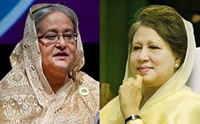Election eve violence in Bangladesh kills two
04 Jan 2014
Renewed violence in Bangladesh killed two more people killed on the eve of elections on Sunday in which Sheikh Hasina's ruling Awami League looked certain to return to power, with the main opposition party boycotting the poll.
 The opposition Bangladesh Nationalist Party (BNP) called a 48-hour strike starting Saturday, in addition to a transportation blockade, and urged voters to keep away from the "farcical" election.
The opposition Bangladesh Nationalist Party (BNP) called a 48-hour strike starting Saturday, in addition to a transportation blockade, and urged voters to keep away from the "farcical" election.
With the BNP out of the picture, only 146 of 300 parliamentary constituencies are being contested.
"I call upon countrymen to fully boycott the disgraceful farce in the name of election of January 5," BNP chief Begum Khaleda Zia, who claims to be under virtual house arrest, said in a statement late yesterday. The government has denied that she had been confined or under house arrest.
The BNP's objection stems from the discontinuation of the practice of having a caretaker government to oversee elections by Sheikh Hasina, daughter of Sheikh Muhibur Rehman, founder of Bangladesh.
Also many BNP leaders are in jail or in hiding. With the legitimacy of the polls hit by the boycott, political observers worry about the impact on the economy and prospects of further violence in the country of 160 million.
Barring a period of two years, in the past 22, the office of the prime minister has been held by Hasina or Khaleda who have been bitter rivals.
Meanwhile tensions are running high, with local media reporting arson attacks on polling stations overnight.
Violence during the election campaign has claimed at least 100 lives.
The strike comes as the latest in a series of protests by the BNP and its allies - including the Islamist Jamaat-e-Islami party, which has led to road blockades, disruption of railways and waterways and the closure of shops, schools and offices.
Police shootings have left scores of opposition supporters dead while numerous commuters have been burnt to death as protesters hurled petrol bombs at buses defying strike calls.
The legitimacy of the polls has been further hit by the refusal of both the US and the EU to send observers, further raising questions.
All elections since 1991 had been held under a neutral caretaker administration to ensure that the electoral process was not rigged.
The Awami League, however, abolished the caretaker system in 2010, arguing that it was not needed any longer, using its two-thirds majority in parliament to make the change.
A special envoy of UN secretary general Ban Ki-moon visited Dhaka last month in a bid to get the two sides to talk to each other but the dialogue never materialised.



















